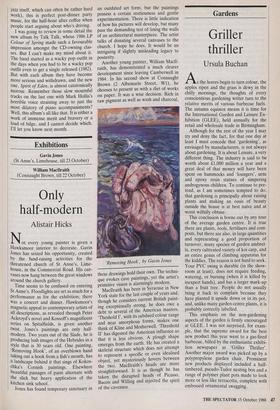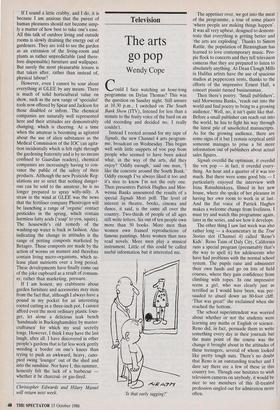Gardens
Griller thriller
Ursula Buchan
As the leaves begin to turn colour, the apples ripen and the grass is dewy in the chilly mornings, the thoughts of every conscientious gardening writer turn to the relative merits of various barbecue fuels. The autumn equinox means it is time for the International Garden and Leisure Ex- hibition (GLEE), held annually for the retail and wholesale trade in Birmingham.
Although for the rest of the year I may try and deny the fact, for that one day at least I must concede that 'gardening', as envisaged by manufacturers, is not always about gardening. It is about Leisure, a very different thing. The industry is said to be worth about £1,000 million a year and a great deal of that money will have been spent on hammocks and 'loungers', urns and epoxy resin statues of simpering androgynous children. To continue to pre- tend, as I am sometimes tempted to do; that gardening is principally about raising plants and making an oasis of beauty outside the house is at best naïve and at worst wilfully obtuse.
This conclusion is borne out by any tour of the average garden centre. It is true there are plants, tools, fertilisers and com- posts, but there are also, in large quantities and representing a good proportion of turnover, many species of garden umbrel- la, every cultivated variety of koi carp, and an entire genus of climbing apparatus for the kiddies. The reason is not hard to seek. Your PVC swing is durable (in the show- room at least), does not require feeding, watering, or burning (when it is killed by inexpert hands), and has a larger mark-up than a fruit tree. People do not usually bring it back to complain because they have planted it upside down or in its pot, and, unlike many garden centre plants, it is probably correctly labelled.
This emphasis on the non-gardening aspects of the garden is firmly encouraged at GLEE. I was not surprised, for exam- ple, that the supreme award for the best new product this year went to a gas-fired barbecue, billed by the enthusiastic exhibi- tion newspaper as 'Griller Thriller'. Another major award was picked up by a polypropylene garden chair. Prominent new products displayed included a half- timbered, pseudo-Tudor nesting box and a range of polymer plant pots made to look more or less like terracotta, complete with .embossed ornamental swagging. If I sound a little crabby, and I do, it is because I am anxious that the purest of human pleasures should not become simp- ly a matter of how best to take one's ease. All this talk of outdoor living and outside rooms is slowly draining the energy out of gardeners. They are told to see the garden as an extension of the living-room and plants as rather unpredictable (and there- fore dispensable) furniture and wallpaper. But surely the most pleasurable leisure is that taken after, rather than instead of, physical labour?
However, even I cannot be sour about everything at GLEE by any means. There is much of solid horticultural value on show, such as the new range of `specialist' tools now offered by Spear and Jackson for those disabled or infirm. The chemical companies are naturally well represented here and their attitudes are demonstrably changing, which is cheering. At a time when the amateur is becoming as agitated about the use of alien substances as the Medical Commission of the IOC (an agita- tion incidentally which is felt right through the gardening fraternity and is by no means confined to Guardian readers), chemical companies are increasingly having to con- vince the public of the safety of their products. Although the new Pesticide Reg- ulations are so strict that nothing danger- ous can be sold to the amateur, he is no longer prepared to spray willy-nilly. A straw in the wind at GLEE was the news that the fertiliser company Phostrogen will be launching a range of 'organic' contact pesticides in the spring, which contain harmless fatty acids (`soap' to you, squire). The housewife's old remedy of the washing-up water is back in fashion. Also indicating the change in attitudes is the range of potting composts marketed by Betagro. These composts are made by the action of worms on manure and therefore contain living micro-organisms, which re- lease plant nutrients over a long period. These developments have finally come out of the joke cupboard as a result of consum- er, rather than marketing, pressure.
If I am honest, my crabbiness about garden furniture and accessories may stem from the fact that, although I always have a pound in my pocket for an interesting rooted cutting in a three-inch pot, I cannot afford even the most ordinary plastic loun- ger, let alone a delicious teak bench `handmade in Buckinghamshire by master- craftsmen' for which my soul secretly longs. However, I think I may have the last laugh, after all. I have discovered in other people's gardens that is far less work gently weeding a border on one's knees than trying to push an awkward, heavy, cano- pied swing 'lounger' out of the shed and into the sunshine. Nor have I, this summer, honestly felt the lack of a barbecue — whether it be charcoal- or gas-fired.
Christopher Edwards and Hilary Mantel will return next week.



























































 Previous page
Previous page